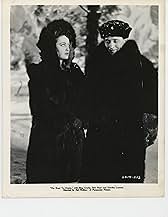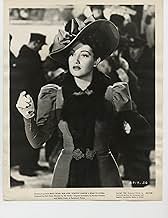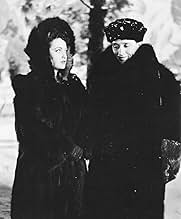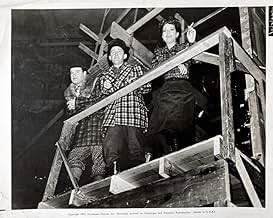VALUTAZIONE IMDb
7,1/10
3911
LA TUA VALUTAZIONE
Aggiungi una trama nella tua linguaTwo vaudeville flops pose as bad guys and join the Klondike gold rush with a saloon singer.Two vaudeville flops pose as bad guys and join the Klondike gold rush with a saloon singer.Two vaudeville flops pose as bad guys and join the Klondike gold rush with a saloon singer.
- Regia
- Sceneggiatura
- Star
- Candidato a 1 Oscar
- 3 vittorie e 1 candidatura in totale
Jack La Rue
- LeBec
- (as Jack LaRue)
George Anderson
- Townsman
- (non citato nei titoli originali)
Stanley Andrews
- Joe - Official at Ship
- (non citato nei titoli originali)
Bobby Barber
- Bartender
- (non citato nei titoli originali)
William 'Billy' Benedict
- Second Newsboy
- (non citato nei titoli originali)
Carmella Bergstrom
- Woman
- (non citato nei titoli originali)
Billy Bletcher
- Bear
- (voce)
- (non citato nei titoli originali)
Phil Bloom
- Show Spectator
- (non citato nei titoli originali)
Eddie Borden
- Man in Saloon
- (non citato nei titoli originali)
Rudy Bowman
- Show Spectator
- (non citato nei titoli originali)
Recensioni in evidenza
Crosby and Hope are at it again, this time searching for gold in Alaska. The great lines don't run as fast and furious here as they do in some of the other "Road" pictures, but there are still plenty of laughs to go around. The film loses some points in two areas: the unnecessary and unfunny commentary by Robert Benchley and the simple fact that the premise of the film is completely ridiculous. I still cannot figure out why Crosby and Hope would spend half the film pretending to be two men they know are wanted killers. Of course, thanks to movie magic, the local authorities seem to ignore this. However, these things don't detract much from this very funny film.
How does this zany mid-1940's comedy/musical rate in the year 2003? I'm going to venture a guess and suggest that it probably doesn't rate as high with viewers as it may have when it was originally released. Some of the gags and one-liners seem to be about pop-culture that is obscure in the new millenium. I had a strong sense that parts of the movie were originally funny but that the humor is lost on viewers who were not alive in the 1940's.
Notwithstanding, there are some very funny bits and one-liners in this film. Here and there throughout the film, the comedy clicked and I found myself laughing out loud. On the other hand, I have watched the film twice and both times that I watched it, I was growing tired of the endless one-liners to the point that they were becoming annoying. This film definitely seems to lose quite a bit of its comic sparkle by the end, and the ending is truly idiotic.
On the other hand, I did truly enjoy several of the songs in this movie. Two that stand out are Bing Crosby singing "Welcome to My Dream" and Dorothy Lamour singing "Personality". Unfortunately, some of the good songs, especially "Welcome To My Dream" seem a bit out of place in this zany movie!
Hillary Brooke, a fine 1940's actress who appeared in a couple of Sherlock Holmes movies is totally wasted in this comedy. She looks as though she is sleepwalking through her part. Her on-screen performance comes across as if she doesn't want to be participating in this move. She is far more competent as an actress than this movie would lead you to believe.
This movie is not for all tastes. Bob Hope and Bing Crosby fans may enjoy it, but time has not been kind to this movie. I give it a 7 out of 10 points.
Notwithstanding, there are some very funny bits and one-liners in this film. Here and there throughout the film, the comedy clicked and I found myself laughing out loud. On the other hand, I have watched the film twice and both times that I watched it, I was growing tired of the endless one-liners to the point that they were becoming annoying. This film definitely seems to lose quite a bit of its comic sparkle by the end, and the ending is truly idiotic.
On the other hand, I did truly enjoy several of the songs in this movie. Two that stand out are Bing Crosby singing "Welcome to My Dream" and Dorothy Lamour singing "Personality". Unfortunately, some of the good songs, especially "Welcome To My Dream" seem a bit out of place in this zany movie!
Hillary Brooke, a fine 1940's actress who appeared in a couple of Sherlock Holmes movies is totally wasted in this comedy. She looks as though she is sleepwalking through her part. Her on-screen performance comes across as if she doesn't want to be participating in this move. She is far more competent as an actress than this movie would lead you to believe.
This movie is not for all tastes. Bob Hope and Bing Crosby fans may enjoy it, but time has not been kind to this movie. I give it a 7 out of 10 points.
Duke Johnson (Bing Crosby) and Chester Hooton (Bob Hope) are struggling entertainers down on their luck who travel to Alaska. Killers Sperry and McGurk steal a vital map showing the location of a gold mine. Our two heroes manage to obtain the map and decide to impersonate Sperry and McGurk which leads them into more trouble than they could ever have imagined. Along the way they meet saloon singer Sal Van Hoyden (Dorothy Lamour) and as usual both men compete for her charms. With Sperry and McGurk hot on their trail plus other assorted villains after them Hope and Crosby get into many tight corners but they still find time for some catchy songs along the way including "Put It There Pal" which is a typical Hope/Crosby kind of number and Dorothy Lamour puts over "Personality" with her usual flair.
Of all seven of the "Road" pictures there are four which to me are outstanding and superior to any other comedy films from that same period. The "Road" films have certainly stood the test of time over the years and not become dated. My four favourites are the Roads to "Morocco", "Utopia", "Rio" and "Bali". Hope and Crosby worked well together as a team and in "Road to Utopia" reached new comedy heights. The film is very fast moving with gag following gag, talking animals, many hilarious comedy routines and situations, and even has Robert Benchley occasionally interrupting the proceedings to give an entertaining commentary on the film. The film is told in "flashback" and has a brilliant pay-off line at the end (one of the best in the entire "Road" series).
Some favourite lines from the film:
Bob Hope (to Bing Crosby): "I didn't think there was one more way to get the cops after us but you found it!".
Hope (to Crosby): "Next time I'll bring Sinatra!". (When Crosby loses a talent contest on board ship).
Hope (to Crosby): "It may be a mountain to you but it's bread and butter to me".
Hope (to Douglass Dumbrille): "I'll take a lemonade .... in a dirty glass!".
Hope (to audience): "We adopted him!".
The "Road" films never won any Oscars but brought an enormous amount of pleasure to a lot of people during the 40's. Hope and Crosby were a great team and made seven "Road" films in total. They both had very successful careers separately in movies, television, radio and on the stage and were probably two of the biggest stars to come out of Hollywood in the thirties and forties. 10/10. Clive Roberts.
Of all seven of the "Road" pictures there are four which to me are outstanding and superior to any other comedy films from that same period. The "Road" films have certainly stood the test of time over the years and not become dated. My four favourites are the Roads to "Morocco", "Utopia", "Rio" and "Bali". Hope and Crosby worked well together as a team and in "Road to Utopia" reached new comedy heights. The film is very fast moving with gag following gag, talking animals, many hilarious comedy routines and situations, and even has Robert Benchley occasionally interrupting the proceedings to give an entertaining commentary on the film. The film is told in "flashback" and has a brilliant pay-off line at the end (one of the best in the entire "Road" series).
Some favourite lines from the film:
Bob Hope (to Bing Crosby): "I didn't think there was one more way to get the cops after us but you found it!".
Hope (to Crosby): "Next time I'll bring Sinatra!". (When Crosby loses a talent contest on board ship).
Hope (to Crosby): "It may be a mountain to you but it's bread and butter to me".
Hope (to Douglass Dumbrille): "I'll take a lemonade .... in a dirty glass!".
Hope (to audience): "We adopted him!".
The "Road" films never won any Oscars but brought an enormous amount of pleasure to a lot of people during the 40's. Hope and Crosby were a great team and made seven "Road" films in total. They both had very successful careers separately in movies, television, radio and on the stage and were probably two of the biggest stars to come out of Hollywood in the thirties and forties. 10/10. Clive Roberts.
If you need some laughs, this is a movie for you. I think this is the fourth of the "Road" pictures that Hope and Crosby made together. "The Road to Rio" was good, too, but the ones that followed demonstrated a flagging of inspiration.
Here, they are the crew are at their best. The plot is screwball, as usual, and not worth spelling out. What counts are the songs, the gags, and the interplay between the three principals -- Hope, Crosby, and Dorothy Lamour.
Most of the Road pictures had one or two songs which wound up on the pop charts. They were usually kind of pretty and unpretentious, "easy listening", to coin a phrase. (Oh, bring it back, sob!) "Moonlight Becomes You," "Personality," "Welcome to My World." And Bing did most of the singing in his smooth baritone. Nothing more than proficient and pleasant to listen to, although he belonged to, I think, a peppy vocal trio in the early 1930s whose arrangements were kind of original.
The gags were usually amusing, sometimes laugh-out-loud funny. There was, inevitably the occasional clunker but everything was so good natured that they are easily forgiven. The script was by Panama and Frank, but many of the jokes were improvised on the set by the actors. Hope also brought in some gags from his platoon of writers (he was a famous radio comedian at the time), giving some of them to Crosby and Lamour as well. There was a good deal of playing with the fourth wall and a lot of in jokes too. Some of these may be lost on modern viewers. Eg., Hope is driving Crosby along on a dog sled, and he raises his arms and says, "Look Ma, no hands." "Look Ma, no teeth," remarks Crosby. "Please," says Hope, "my sponsor." His radio sponsor was Pepsodent Toothpaste.
The three principal actors play off each other well. Dorothy Lamour was an unpretentious actress of modest talents who never pretended to be anything else, although she provided a very nice frame to hang a sarong on. What I like most about the relationship between Hope and Crosby is the measured equality of their stupidity and greed. Hope wasn't really subordinate to Crosby. Everything Hope said and did was within the realm of human reality. He didn't have the flapping run or squeaky voice of Jerry Lewis. He didn't get slapped around like Lou Costello. He wasn't intellectually challenged. And Crosby was much more of a participant in the goings on than a straight man would be. He's hardly less gullible than Hope, and equally cowardly. When they're about to be boiled by cannibals or hanged by vigilantes, they trade wisecracks with one another. Crosby is the promoter and Hope is the stooge, but neither is superior to the others.
This really is a relaxing ride. I spent a summer doing a sociological study of Scagway. The set gives a surprisingly good suggestion of what it still looks like. It's a dramatic place overlooked by a proud glacier the color of blue glass. And the kind of Wild West atmosphere the movie evokes isn't entirely fictional. People had names like "Soapy Smith".
Here, they are the crew are at their best. The plot is screwball, as usual, and not worth spelling out. What counts are the songs, the gags, and the interplay between the three principals -- Hope, Crosby, and Dorothy Lamour.
Most of the Road pictures had one or two songs which wound up on the pop charts. They were usually kind of pretty and unpretentious, "easy listening", to coin a phrase. (Oh, bring it back, sob!) "Moonlight Becomes You," "Personality," "Welcome to My World." And Bing did most of the singing in his smooth baritone. Nothing more than proficient and pleasant to listen to, although he belonged to, I think, a peppy vocal trio in the early 1930s whose arrangements were kind of original.
The gags were usually amusing, sometimes laugh-out-loud funny. There was, inevitably the occasional clunker but everything was so good natured that they are easily forgiven. The script was by Panama and Frank, but many of the jokes were improvised on the set by the actors. Hope also brought in some gags from his platoon of writers (he was a famous radio comedian at the time), giving some of them to Crosby and Lamour as well. There was a good deal of playing with the fourth wall and a lot of in jokes too. Some of these may be lost on modern viewers. Eg., Hope is driving Crosby along on a dog sled, and he raises his arms and says, "Look Ma, no hands." "Look Ma, no teeth," remarks Crosby. "Please," says Hope, "my sponsor." His radio sponsor was Pepsodent Toothpaste.
The three principal actors play off each other well. Dorothy Lamour was an unpretentious actress of modest talents who never pretended to be anything else, although she provided a very nice frame to hang a sarong on. What I like most about the relationship between Hope and Crosby is the measured equality of their stupidity and greed. Hope wasn't really subordinate to Crosby. Everything Hope said and did was within the realm of human reality. He didn't have the flapping run or squeaky voice of Jerry Lewis. He didn't get slapped around like Lou Costello. He wasn't intellectually challenged. And Crosby was much more of a participant in the goings on than a straight man would be. He's hardly less gullible than Hope, and equally cowardly. When they're about to be boiled by cannibals or hanged by vigilantes, they trade wisecracks with one another. Crosby is the promoter and Hope is the stooge, but neither is superior to the others.
This really is a relaxing ride. I spent a summer doing a sociological study of Scagway. The set gives a surprisingly good suggestion of what it still looks like. It's a dramatic place overlooked by a proud glacier the color of blue glass. And the kind of Wild West atmosphere the movie evokes isn't entirely fictional. People had names like "Soapy Smith".
Bob and Bing pal through this in their breezy manner, ably assisted by Dottie Lamour and especially the dry witty commentary of humorist Robert Benchley. Students of film and lovers of movies will appreciate the quality of the production, and rejoice in the knowledge that not everything funny was created after 1990.
Lo sapevi?
- QuizBob Hope recalled that during the scene where he and Bing Crosby were bedding down beside their cabin in the Klondike, they were to be joined by a bear. They were told that the bear was tame and its trainer would always be nearby. Against their better judgment they went along with it. However, when the cameras started filming, the bear ambled over to Hope and, instead of lying down next to him like it was supposed to, the animal sniffed him and started growling. Hope and Crosby immediately stopped the scene and refused to work with the bear any longer, despite the trainer's protestations that it was tame and harmless. The next day the bear attacked its trainer and tore his arm off.
- BlooperThe right arm of the person holding the talking fish is visible.
- Citazioni
[Duke loses a talent show to a trained monkey]
Chester Hooton: [to Duke] Next time I bring Sinatra.
- Curiosità sui creditiNarrator Robert Benchley credits himself orally in a precredit sequence.
- ConnessioniFeatured in Paramount Presents (1974)
- Colonne sonorePut It There, Pal
(1946)
Music by Jimmy Van Heusen
Lyrics by Johnny Burke
Played during the opening credits and also as background music
Performed later by Bing Crosby and Bob Hope
I più visti
Accedi per valutare e creare un elenco di titoli salvati per ottenere consigli personalizzati
- How long is Road to Utopia?Powered by Alexa
Dettagli
- Tempo di esecuzione
- 1h 30min(90 min)
- Colore
- Proporzioni
- 1.37 : 1
Contribuisci a questa pagina
Suggerisci una modifica o aggiungi i contenuti mancanti

![Guarda Trailer [EN]](https://m.media-amazon.com/images/M/MV5BNWRiMzM4OTktNDlkMS00YWJiLWEwNDMtZTY0ZjAwMzY3YjM2XkEyXkFqcGdeQXRyYW5zY29kZS13b3JrZmxvdw@@._V1_QL75_UX500_CR0)






















